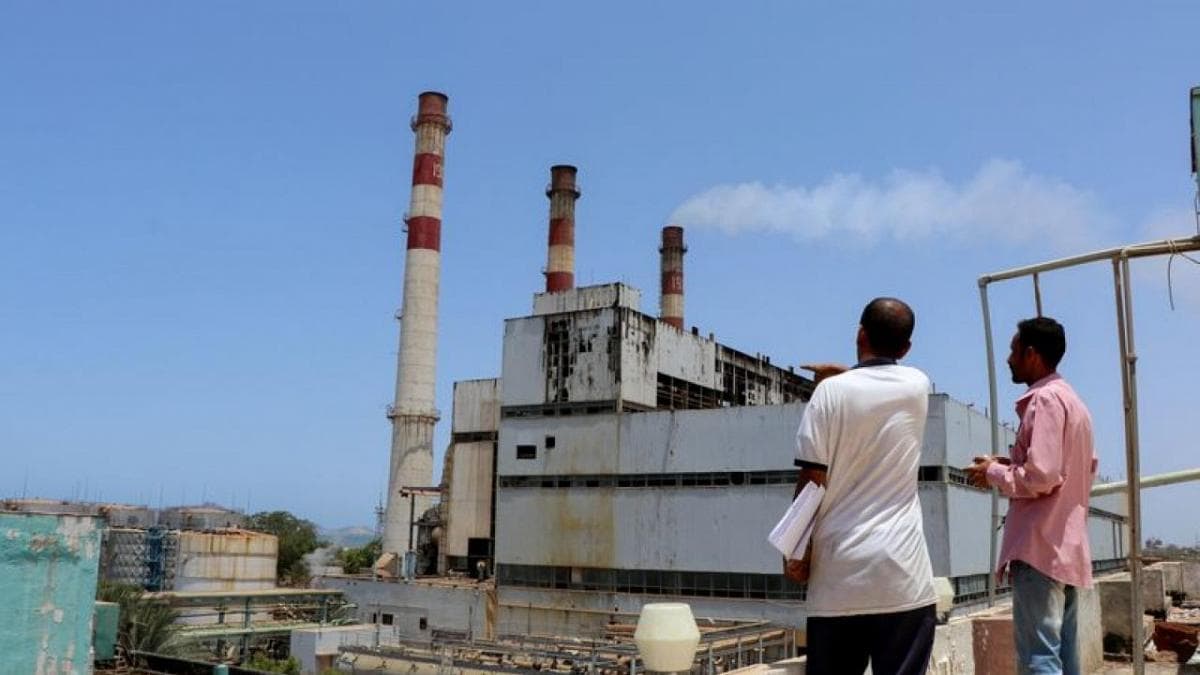
Aden electricity (Reuters)
Last updated on: 13-06-2022 at 3 PM Aden Time

Raad Alrimi (South24)
The coastal capital Southern city of Aden lives in complete darkness all the day. This service crisis has constituted one form of suffering in the city since the 1994 war. However, since the defeat of forces affiliated with the Houthis and former President Ali Abdullah Saleh who were driven out of the city 7 years ago, the electricity problem has emerged as one of the most controversial issues in the very hot city.
Despite the intervention by the Saudi-led Arab Coalition in the city and the successive governments, the continuous power outage, especially in summer with record levels of high temperature and moisture, became the people's daily concerns. The electricity crisis has wide consequences on the economic and humanitarian levels as well as the medical services, small industries, communications and other sectors for which electricity represents a vital source. The crisis continues not only in Aden but in the neighboring governorates such as Lahj, Al-Dhalea and Abyan.
In this field report, "South24" sought to highlight this thorny issue. Our Aden Office's reporter met a number of officials in different sectors. Meanwhile, officials in the PM's office have so far ignored answering our questions or commenting on the content of this report.
Fuel grant
Despite the declaration about the projects to prepare and make maintenance works to the city's power plants along with the establishment of a new station named after former Yemeni President Hadi, the electricity sector in Aden has not witnessed any real improvement even under the Parity Government which was formed as a result of the Riyadh Agreement in 2019.
The electricity problem is mainly related to the lack of generating capacity and the urgent need to make maintenance for a number of governmental power plants. Moreover, the lack of electricity fuel (mazut and diesel) is a problem which has stuck to the successive administrations. Additionally, there are mutual corruption accusations among the governmental parties.
On March 31st 2021, the KSA announced a new oil derivatives grant with a total value of 422 million $ to operate power plants in a number of governorates, especially Aden. The grant came after the daily power blackout rate in Aden exceeded 19 hours due to the fuel unavailability. Although this grant actually contributed in making some improvements in the electricity service in Aden and some other governorates during past months, many problems accompanied it such as the delay of the grant's batches and shipments for days and weeks which made Aden. Thus, Aden has been mired in the darkness again. Moreover, the grant was about to stop many times due to the disputes between the Saudi donor and the Yemeni parties, especially the government, the governorates' local authorities and the Electricity Corporation.
Last September, a committee responsible for facilitating the grant's oil derivatives batches which consists of governmental figures from the two parties blamed both people and local authorities in Aden for the delay of one batch of the grant. According to Saba News Agency, the committee said that people's refusal to pay their bills and not transferring money to the joint financial account along with the random power links are the reasons behind the delay [1].
However, exclusive sources spoke to "South24" about other reasons behind the delay of many shipments of the fuel grants. According to the sources, the relevant governmental agencies and Aden's Public Electricity Corporation were slack in requesting the city’s stations needs although an article of the deal stipulated that fuel supplies orders have to be sent more than one month before the previous batch ran out of fuel.
According to the sources, this came as part of a plan that aimed at creating shortages in supplying the governmental power plants with their fuel needs. Instead, they tend to buy urgent shipments of commercial fuels with heavy costs under the pretext of covering the deficit.
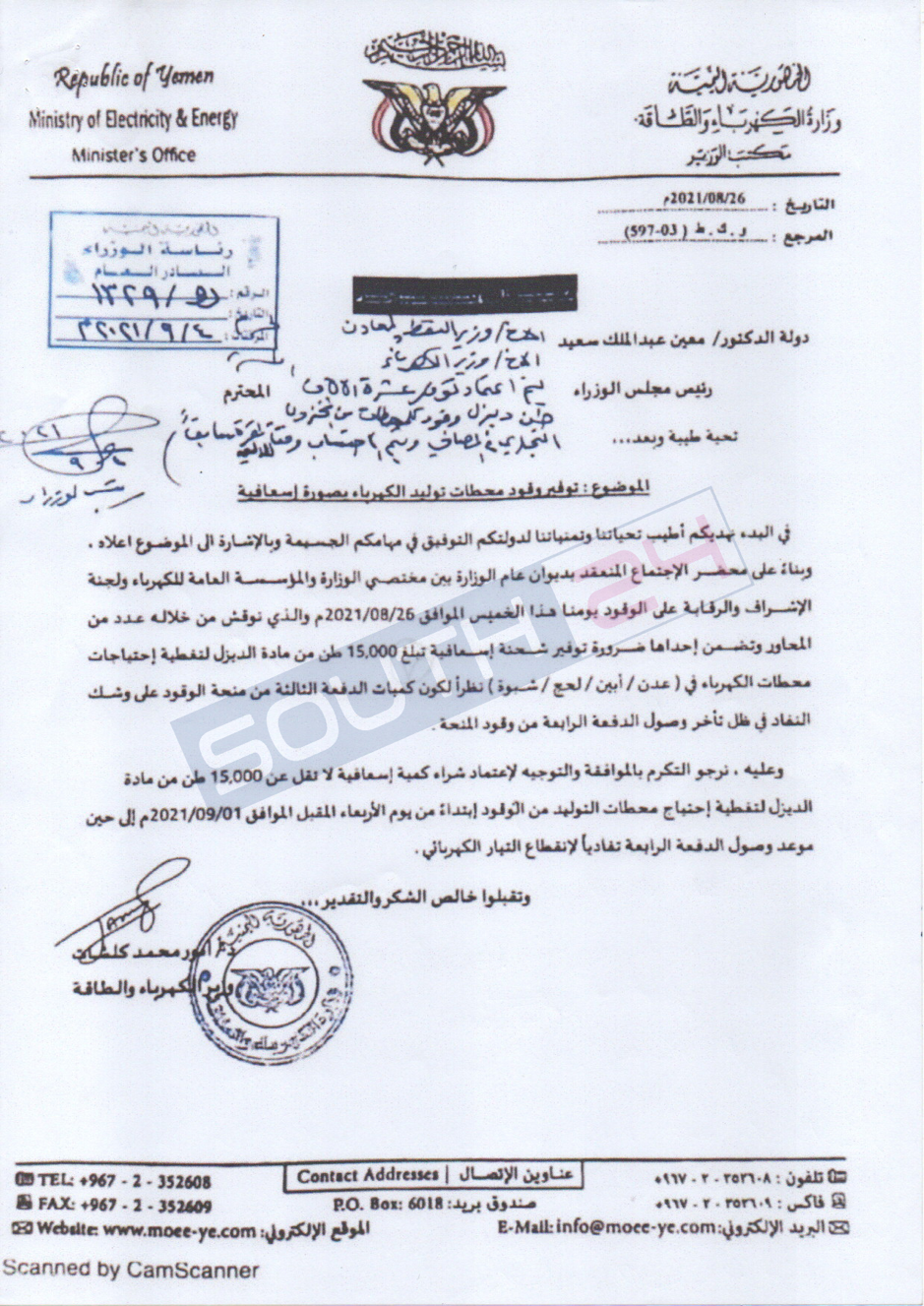
A letter sent by the Electricity Minister to PM Maeen Abdulmalik to demand urgent fuel shipment (a document obtained by "South24").
Aden's Public Electricity Corporation exclusively told "South24" that it is not responsible for the delay of requesting Aden power plants' fuel needs. Salem Al-Walidi, the Director of the Corporation said that "it is the responsibility of both the Oil Ministry and the Finance Ministry".
Commenting on Al-Walidi, Anis Mouawada, Head of the General Union of Aden's Electricity Workers said "this is a kind of evading the truth by Aden's Public Electricity Corporation". He told "South24" that "the Corporation's statements are unrealistic as ordering fuel needs supplies is among its core tasks".
His evidence for that is the presence of "the Fuel Management Department which is tasked with following-up fuel availability. It is the one which provides the Oil Corporation in Aden with data about the amounts needed by the power plants.
However, a document, obtained by "South24 '' contradicts Salem Al-Walidi's statements. Last July, Aden's Governor, Ahmed Lamlas, sent a letter to the Electricity Minister and the Oil Grant Committee in which he talked about the looming depletion of power plants' fuels "according to Public Electricity Corporation' appeal (See the document).
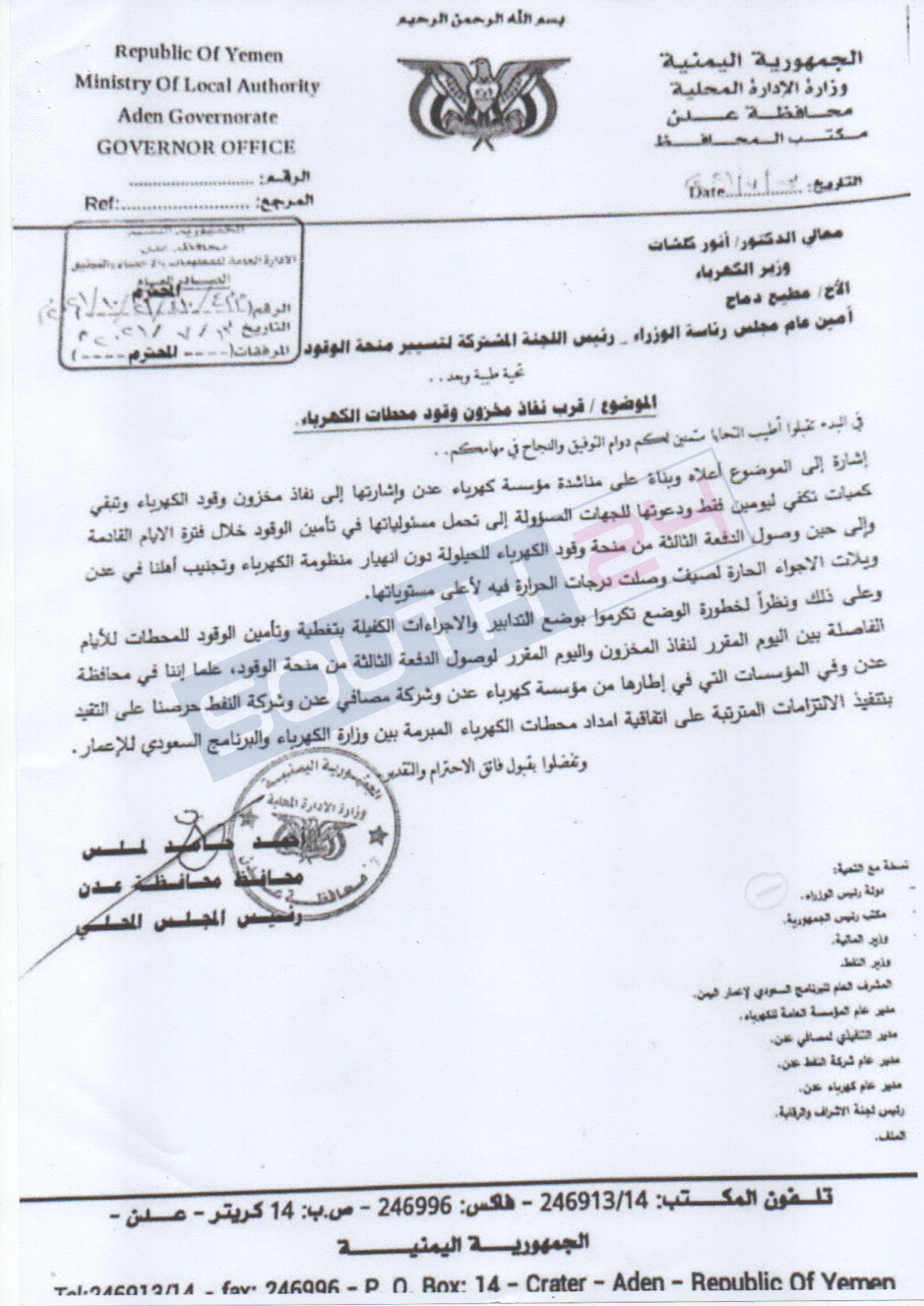
Engineer Ahmed Al-Madkhali, Director of the Saudi Development and Reconstruction Program for Yemen exclusively told "South24" that "the Yemeni side is the cause behind delaying oil derivatives supplies orders" adding that “The Yemeni side often neglects the grant's conditions".
The Saudi Fuel Grant Agreement to operate electricity plants stipulates that the Yemeni side has to submit a request to the Saudi side including the amount of every needed oil derivatives before 35 days of the suggested delivery date and according to the actual needs to operate the electricity plants [2].
Al-Madkhali added that "60% of oil derivatives granted to Yemen go to the Public Electricity Corporation's branch in Aden which unfortunately didn't abide by the grant's conditions. He described the supplies provided by the Public Electricity Corporation in Aden as "nonsense".
Al-Madkhali accused Public Electricity Corporation's branch in Aden of having real intentions to create a rift between the Saudi Program and people.
He added: "There is an agreement with the Yemeni side regarding sending fuel grant revenues to the joint account before agreeing on how the money will be disposed of. This is not limited to maintenance as the Electricity Corporation claims, but the matter is subject to the agreement between the two sides after the revenue is collected".
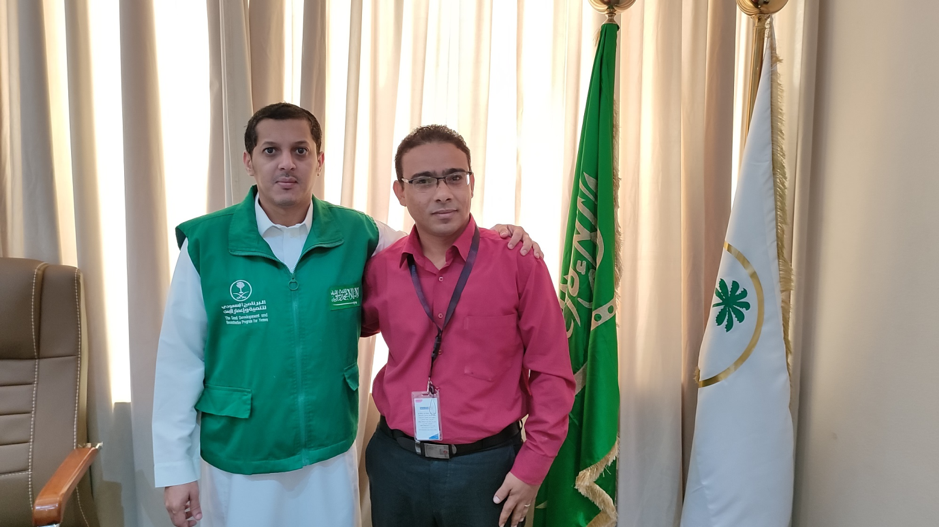
Raad Al-Rimi, "South24" correspondent during the meeting with Ahmed Al-Madkhali, Director of the Saudi Development and Reconstruction Program for Yemen
Al-Madkhali said that the "Yemeni government withdrew all the money in the joint account to buy fuels".
Al-Madkhali denounced the accusations against the Saudi side in this regard adding that: "It is illogical that the Saudi side who paid a 422 million $ grant will bargain over 12 million $. It is not logical. The establishment of the joint account was done for the Yemeni national interest and to develop the Public Electricity Corporation in Yemen but this has not been achieved".
Regarding the renewal of the expired grant, Al-Madkhali said: "the Saudi Development and Reconstruction Program has not yet received an official letter from the Yemeni side to demand the renewal of the grant".
The floating power plant
"South24" met with sources in the Public Electricity Corporation in Aden. They requested anonymity as they are not authorized to speak with media outlets. The sources accused the Yemeni Cabinet of deliberately neglecting the governmental electricity plants in Aden in favor of the rented plants as part of what they described as "corruption deals and common interests ".
According to the sources, the floating power generating plant whose agreement was signed by Maeen Abdulmalik with a total costs that exceed tens of millions is on top of the corrupt deals".
According to a high-level labour source in the Aden's Electricity Corporation, "the presence of purchased power fuels is an actual indicator of the lack of real intentions in the government, The Cabinet, the Supreme Council for Energy, the Electricity Ministry and Aden's Public Electricity Corporation to reform and improve the electricity system".
The source added: "What does the government want by renting a ship that would cost 130 million $ to provide 100 megawatts for one or two years? This is the ugliest form of corruption".
He added: "It is better for the government to allocate this money to complete maintenance works for the internal networks and the power plants along with operating President's Station at full capacity. This will solve a lot of Aden's electricity problems. But the lack of political will for the electricity sector relays its problems from one year to another".
Salem Al-Walidi denies any relationship between the corporation and the proposal to buy the floating power plant.
Al-Walidi refused to comment on the project in general. However he said that: "It will be better to re-equip the local power plants and adopt a strategy that depends on building new electricity stations as well as implementing maintenance for the local plants and preparing Internal drainage networks.”
It is worth mentioning that the Finance Ministry previously refused the floating power plant for many reasons, especially the legal violations. According to a document obtained by "South24", the Ministry said: "the proposal to rent the floating plant is illegal in light of the Electricity and Energy Ministry's rules" (Look at the document).
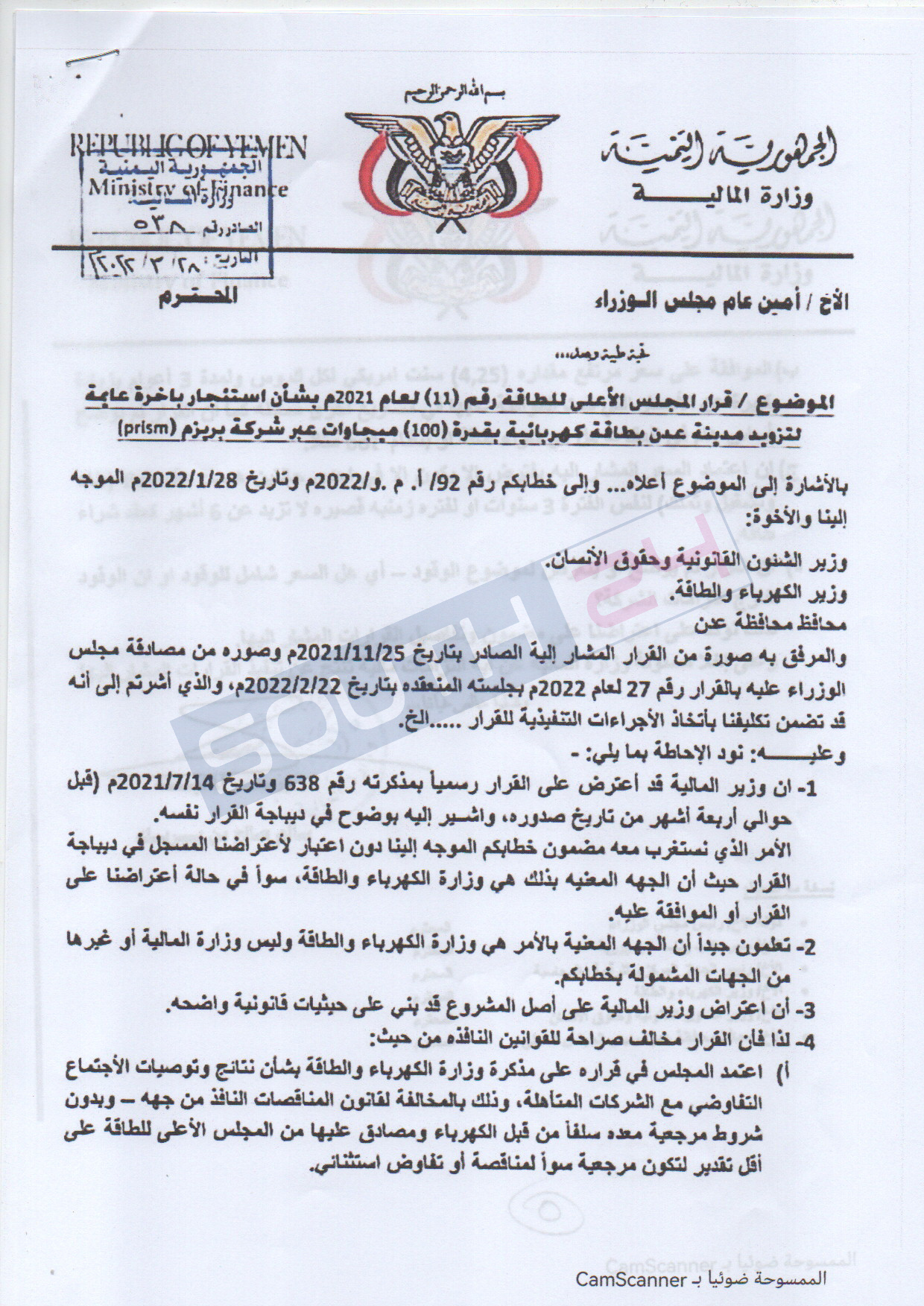
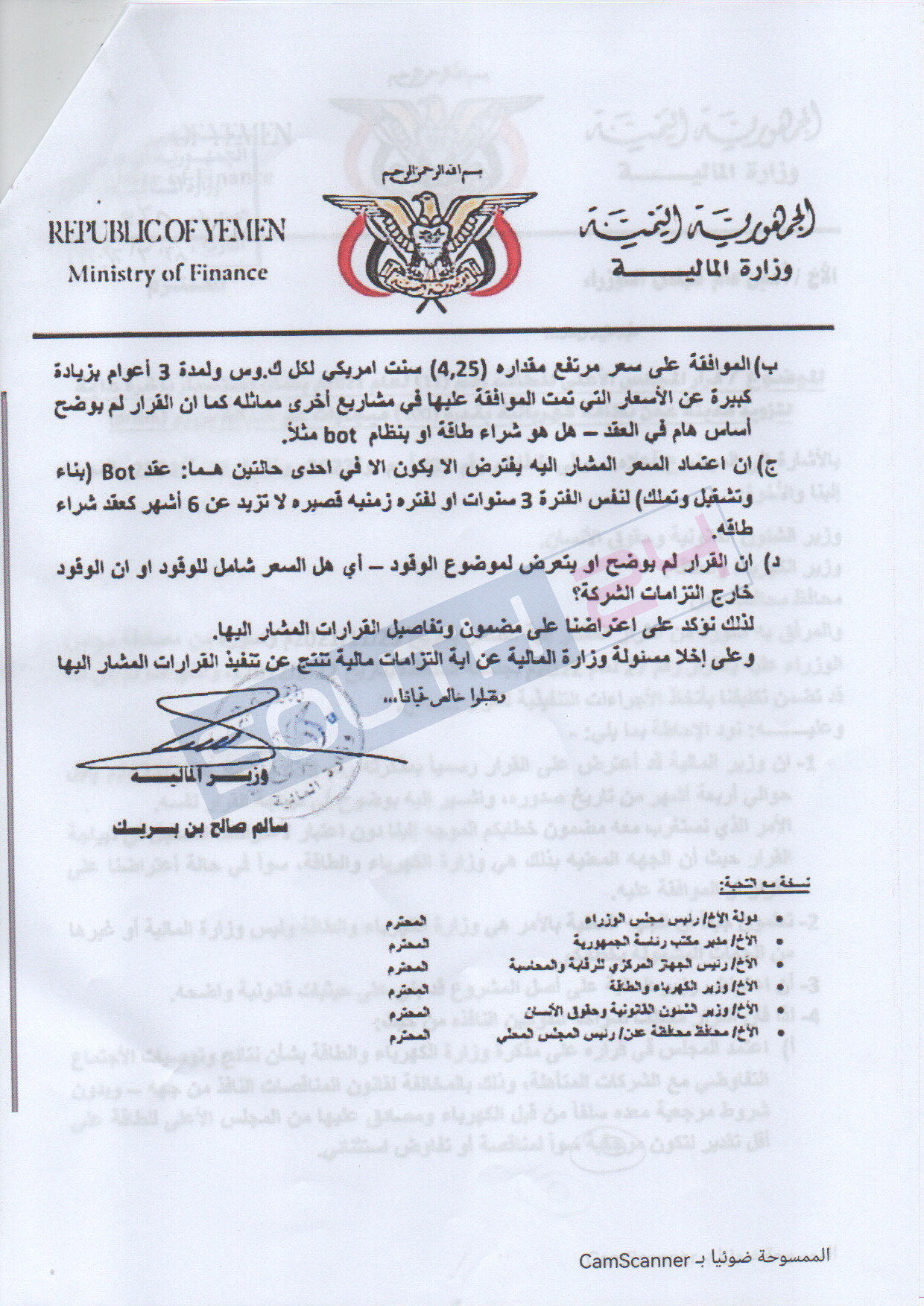
Preparation of infrastructure
Engineers in Aden's Public Electricity Corporation accused the government of deliberately neglecting carrying out maintenance works for the electricity plants in the city in which millions of people live".
Yassin Abdulkarim, the Technical Adviser in Aden's Public Electricity Corporation said: "Aden's electricity plants were deliberately neglected by the successive administrations and governments. He added: "A lot of sub- plants in Aden are overloaded due to the increase in consumption and trade activities in addition to the internal exodus and displacement witnessed by the city".
Exclusive sources told "South24" that "more than 15 billion Yemeni riyals from Aden electricity revenues deposited in the special oil grant joint account were supposed to be used to finance maintenance works of Aden's electricity plants but this didn't happen".
The sources added: "in the past, behind that was the split between the Yemeni Public Electricity Corporation and its branch in Aden. This led to a conflict between numbers sent to the official bodies including the Saudi Development and Reconstruction Program".
He said: "The conflict in the electricity needs numbers between the Yemeni Public Electricity Corporation and its branch in Aden obstructed the efforts of improving the system and its infrastructure". He added: "Khormaksar Plant which had 5 megawatts capacity needed just 7 millions Yemeni riyals to enter the service again after being idle since 2018".
The source asked about "why the Saudi Development and Reconstruction Program ignored a study presented by a delegation from the British company "Wartsila" which assessed the reality of a number of Aden’s power plants and suggested recommendations to improve them. However, this study remained in the drawers".
Eng. Ahmed Al-Madkhali acknowledged the study. He said: "This actually happened. The assessment was sent to Riyadh but there have been no updates yet. There was no promise but only an assessment".
Anis Mouawada accused the Yemeni government of deliberately neglecting the preparation of Aden's electricity infrastructure.
He claimed that: "this is part of a big electricity lobby in general and collusion from Aden's branch, the Ministry and the Public Corporation while parties in the Prime Ministry pushed for that. The plan intends not to prepare these power plants and neglect them in favor of the rented power".
He added: "Al-Haswa plant was prepared in 2018 with a total cost of 31 million $. The Finance Ministry approved the project's financial allocations. The Administrative procedures were carried out. The Ukrainian company was paid more money than the work it did. However, this company was described by specialists as being "fake".
He added: "Unfortunately, the project failed and the company left. Aden didn't benefit from this grant. Likewise, the Qatari power plant was operated in 2017 for about 6 months. Despite the global characteristics of this station which can operate by both gas and diesel systems, neglect made it stop working".
Mouawada indicated that "this station needs 7 million $ today for maintenance ". According to him, "this indicator denotes that neglecting these power plants is not normal but intends to destroy the infrastructure of important service facilities in Aden".
He added: "The internal electricity drainage network in Aden, which dates back to 1964, cannot accommodate more than 200 megawatts in its current state; If it is overloaded, Aden's power transformers will burn".
It is worth mentioning that the Yemeni government repeatedly announced its intention to carry out maintenance works at Aden’s power stations. This includes what was published by the official Saba News Agency one year ago about the PM's instructions to make maintenance but nothing has been achieved so far" [3].
Several labor figures told "South24" that they are surprised by the PM's deal to buy a rented power station while the internal network suffers many problems".
Financial and administrative corruption
Aden's Head of Public Electricity Union said: "Generally, we refuse any rented energy due to its high costs incurred by the state and paying billions of dollars in vain".
He pointed out that “the maintenance of the governmental power stations needs at most 50 million &”.
Mouawada added: “besides the financial loss caused by the rented energy, it also causes technical damage due to the repeated exit of the network because of the rented energy and merging it with the public electricity network”.
Mouawada accused the Yemeni Cabinet of “deliberate alienation of oversight of the electricity sector at a time when the Yemeni government announced the need to end the administrative corruption in the sector according to what was published by Saba News Agency which cited PM Maeen Abdulmalek [4].
“South24” obtained documents issued by the Head of the joint facilitation of fuel grant committee that accused the directors of electricity corporations in the governorates of not abiding by transferring money to the joint account. (Look at the picture)
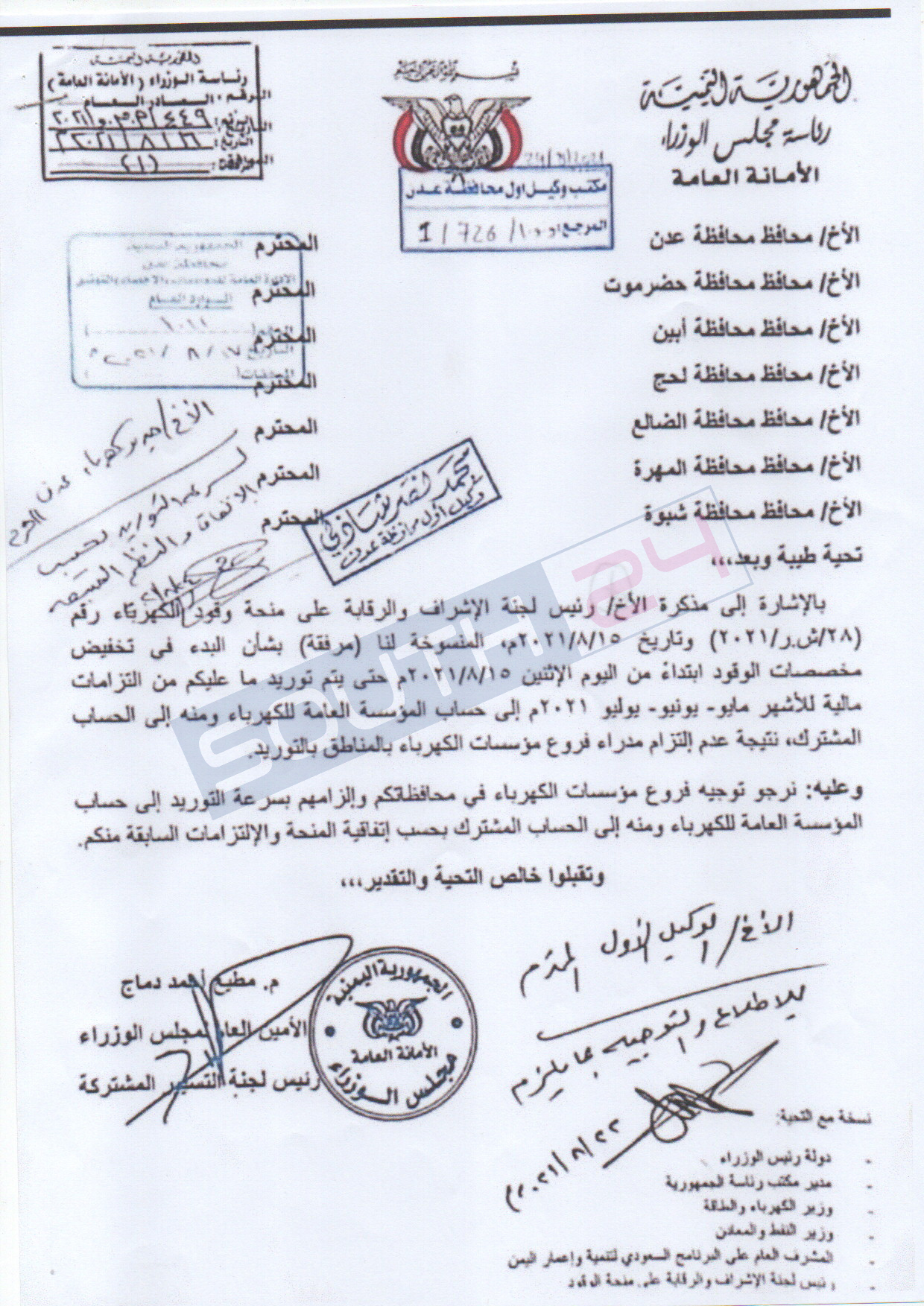
As for the corruption in the corridors of Aden’s Public Electricity Corporation, officials there admitted the existence of "some corruption".
The Corporation's Director claimed that "the revenues of Aden’s Electricity equal 1 billion and 500000 Yemeni riyals, including 500 million riyals being used to pay the salaries of the Corporation's employees and the operating budget". He asked: "How does corruption exist amid this limited financial resources?"
Salem Al-Walidi added: "corruption is not related to the financial resources but depicted in the behaviors of some employees. For example, a generator cannot bear more loads, but some employees add loads in return for a bribe. This affects the overall network and loads. It is a form of corruption".
However Al-Madkhali accused Aden's Public Electricity Corporation of not fulfilling its obligations of transferring electricity revenues to the joint account. The Saudi official said: “There is a debt of 3 billion Yemeni riyals with the Aden Electricity Corporation that was supposed to be transferred to the special account".
"South24” obtained documents in which Electricity Minister Anwar Kalashat instructed Director of Aden's Public Electricity Corporation in January 2021 to send all documents related to stealing 161.97.319 Yemeni riyals from the public revenues of the Electricity 1st District (see the document).
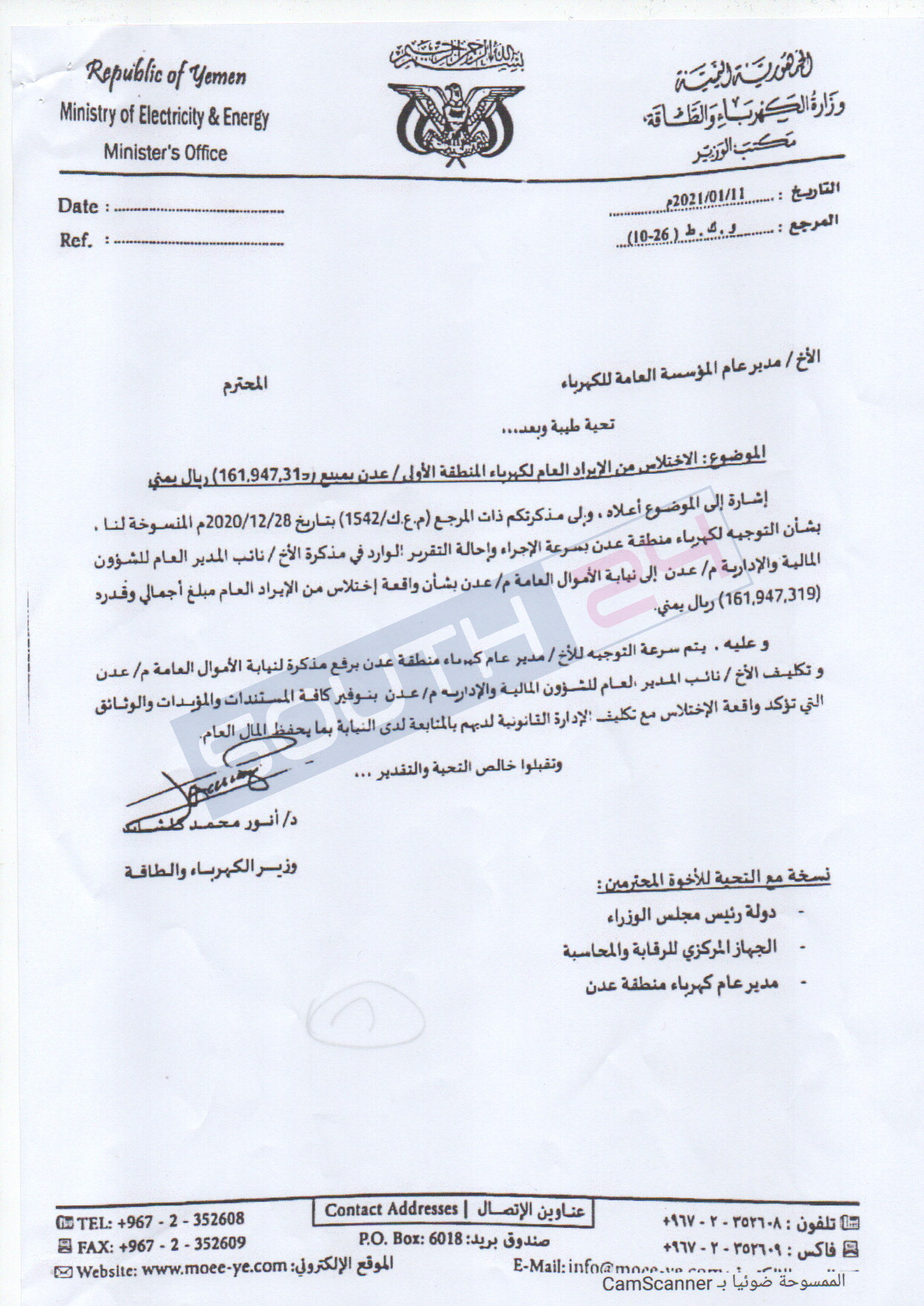
It is worth mentioning that a meeting held by the new Presidential Council one week earlier instructed a set of procedures to improve Aden's electricity conditions. According to Saba News Agency, the PM gave directions to secure the required stock of diesel and mazut for the next two months. He also instructed to re-operate the idle and the rented stations and to connect Petromasila Station (Hadi Station) with its entire capacity.
And yet, as usual, none of these procedures has been implemented while Aden's electricity load continues its rise. People's sufferings increased as they were disappointed by every new political deal in the country which is exhausted by war and starvation.
Note: "South24" contacted the Yemeni Cabinet to comment on the accusations included in the report. The Cabinet's secretary demanded sending the accusations in an official letter to reply to them. However, we didn't receive any response till the moment of publishing the report.
"South24" guarantees the right to reply to all bodies and figures included in this report.